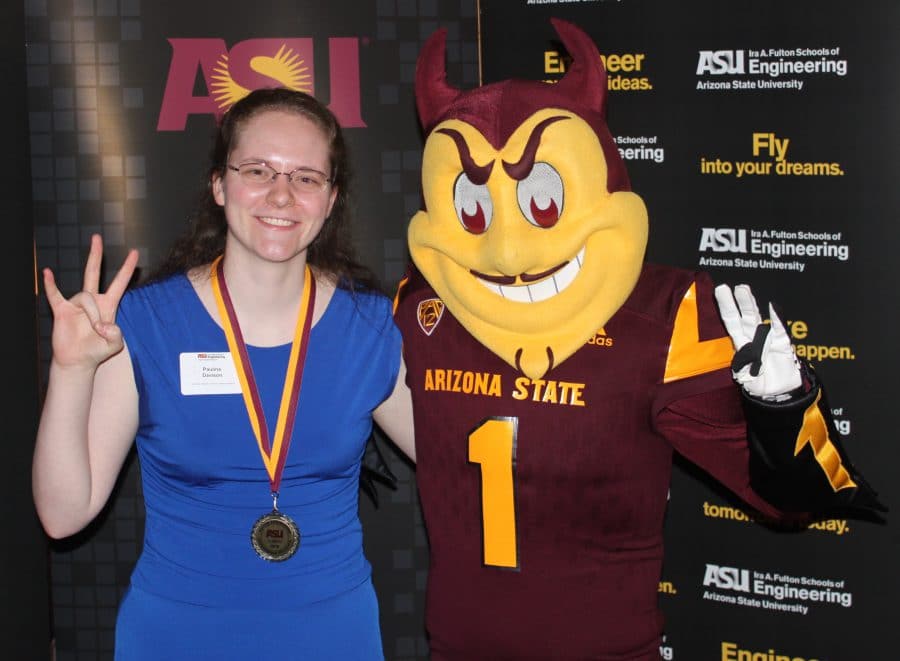Paulina Davison participated in Citizen Potawatomi Nation’s Potawatomi Leadership Program in the summer of 2015 before her sophomore year at Arizona State University. The Weld and Ogee family descendant followed her passion and graduated this spring with a Bachelor of Science in Computer Systems Engineering.
“I’m certainly grateful for the Potawatomi Nation’s Tribal
As a National Merit finalist, Davidson received the New American University Scholarship from ASU. Upon graduation, the ASU Ira A. Fulton School of Engineering faculty named her Outstanding Computer Systems Engineering Graduate. She originally majored in materials

“I enjoyed having that physical knowledge of how is this actually built, but then also looking at what can we do with it abstractly and what are the limitations that are put on it because of the physical world,” she said.
She spent the next summer modeling human lungs using an elastic spring structure with ASU’s Center for Embedded Systems. The project aimed to help better detect asthma by building a prototype that isolates chest movements and mimics the respiratory system’s shape.
Davison’s PLP experience contributed to her success. Davison and her project partner Ross Korzeniewski created a framework to streamline the application and review process for businesses competing for Tribal HEARTH Act leases. During discussions with stakeholders, Davison asked a variety of questions to pinpoint problems and realistic solutions, a method she applied throughout college.
“People that are designing medical devices have to take out as much uncertainty as they can in order to make it reliable and be able to ensure that the information that they’re giving people is accurate,” Davison said.
Cisco Systems chose her as one of their 30 security services division interns for summer 2017. During that time, she worked primarily with the company’s email security appliance and assisted clients in setting up software, evaluating spam and malware filters, and assessing customer needs. The PLP helped her to feel more comfortable moving into a business professional setting and in taking opportunities to ask those around her about their work.
“I think what it showed me is just how valuable computer security is. It’s something that has been continuing to rise in public attention,” she said. “One of the interesting things about it is there are so many puzzles to try and figure out.”
Her senior year brought on a new set of challenges: her thesis for the honors college and capstone project for the engineering college.
Davison chose to work at the Laboratory of Security Engineering for Future Computing at ASU for her thesis. She expanded on research from the University of Michigan, testing the vulnerabilities and increasing the security of smart
“If a car is connected to the internet, there are a lot of avenues for somebody to hack into a car’s microprocessor without being physically near the car,” she said. “And because the internal communication network may not have authentication, then they can use that microprocessor to send messages or to block messages from other microprocessors.”
Davison got more experience through her engineering capstone while building a closed-loop recycling system for Adidas, turning the company’s reusable consumer waste into new products. As part of a team at ASU’s InnovationSpace, she designed and proposed their product-service system to faculty and Adidas representatives. To support their presentation, she built a prototype of the electronic measurement method, a key part of the design.
During her free time, Davison participated in Native American student organizations and fostered relationships with people from CPN and other tribes. The PLP brought her closer to CPN tribal members, Potawatomi culture and the inner-workings of CPN. She values having the opportunity to learn from a variety of different tribal leaders as well as her peers, mentors
“I pay more attention to news about the Nation and people who are Indigenous, seeing what other leaders are doing and what issues are at stake because I have a context for why it matters, how it impacts peoples’ lives and what the history is,” she said.
She was vice president of ASU’s Barrett Indigenous Culture Association, and with its other officers, helped host events and represent the association to current and prospective ASU students. She cherished having a space to discuss Native identities and celebrate their diversity. Among other events, the association hosted student cultural presentations and an annual fashion show of professional Native American designers.
She wants to attend graduate school in fall 2019, possibly at Stanford University, Carnegie Mellon University, the University of Southern California or the University of Washington. She applies the Potawatomi principles she learned while making these types of life-altering decisions.
“I think a huge part for me is just understanding the cultural values that we have and how they carry through my family, how they carry through my actions, and where I need to adjust so that my values and actions align,” Davison said. “I’m at a very reflective point.”
Read more about the Potawatomi Leadership Program, including how to apply, at plp.potawatomi.org.
